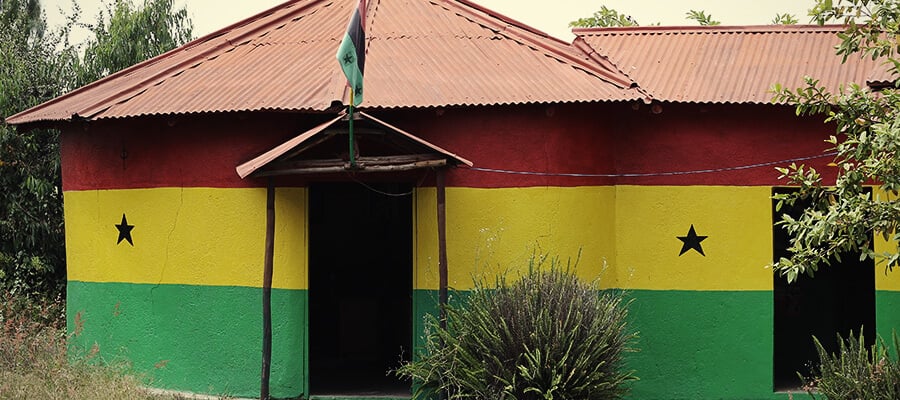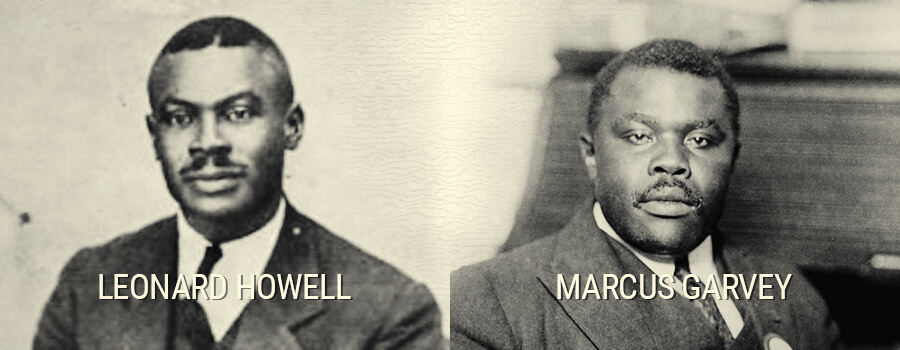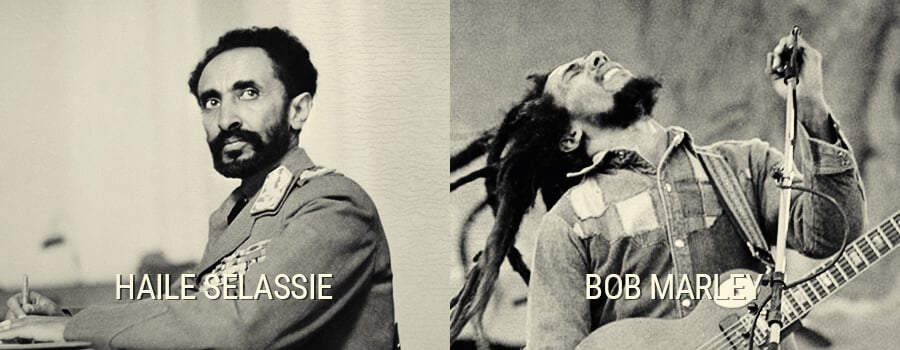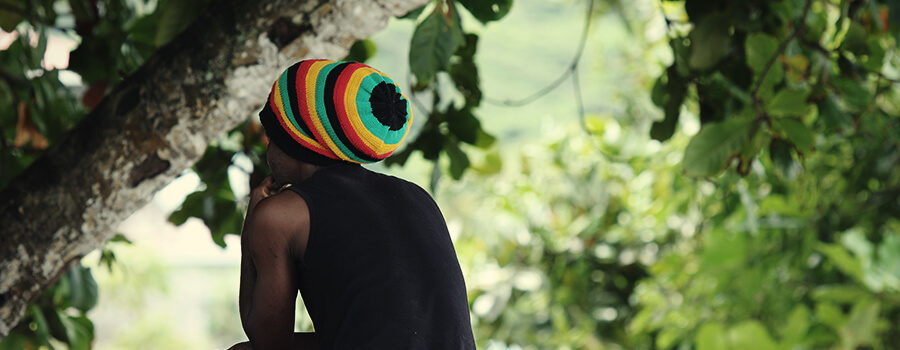The History Of The Rastafari Movement And Cannabis
Rastafari is a religious movement that has long been associated with cannabis. Their use of the herb in communal rituals has become known worldwide. This is the story of the faith, and the role cannabis plays in their beliefs.
...
If you have had any exposure to cannabis culture, you will have seen the prominence of Rastafari iconography. Rastafari is a religious movement that originated in Jamaica. It was popularised around the world through reggae music. Converts like Peter Tosh and Bob Marley were particularly famous advocates. What began with very humble origins ended up spreading all over the globe. To this day, the largest populations of Rastafari live in countries as far-flung as Jamaica, Ethiopia, Botswana, South Africa, the United Kingdom, the United States, and for some reason, even Japan. On a global scale, there is estimated to be around one million followers, which isn't bad for a movement founded in the 1930s.
Yes, the Rastafari faith is less than a century old, yet it is already known throughout the world. It is distinctive for being caricatured as the religion that lets you smoke weed. The truth is a bit more nuanced than that, even when it comes to classifying Rastafari as a religion. Some practitioners will insist it's more of a lifestyle and philosophy toward life than a religious doctrine. It does avoid many features of organised religion, such as clergy or formal leadership. But spirituality does play a big part in its Afrocentric interpretation of Christianity and its reasons for promoting cannabis use.

THE EMERGENCE OF THE RASTAFARI
When investigating the origins of a religious movement, it can be insightful to look at the cultural context in which it emerged. The early 20th century saw a world pushing forward with technological advancements. The institution of slavery, which had terrorised millions of lives in America and beyond, was no longer in place. Its toxic consequences were still being felt, generation after generation, and many other racist policies persisted, particularly in the United States. Black people in America were stepping up their political activism, establishing colleges, newspapers, political groups, and so on.
A prominent activist for the rights of African Americans was Marcus Garvey. Garvey was controversial, even among the black community, for some of his views. For example, he advocated that black people emigrate to their ancestral homelands in Africa to help the economic development of these places as ethno-states for black people. He even established the Black Star shipping line to facilitate this between 1919 and 1922. In 1920, expressing his confidence in Africa's future, he declared: "Look to Africa, when a black king shall be crowned, for the day of deliverance is at hand!".
This "day of deliverance" was said to have arrived just ten years later in 1930. Ethiopia crowned a black emperor, Haile Selassie I.
The short answer to the question of who founded the Rastafari faith is Leonard Percival Howell. A longer answer recognises the team of preachers around him who collectively began to articulate why the time had come for black people to become Rastafari. Howell is a significant figure in that he took the coronation of Haile Selassie I to be a fulfilment of Marcus Garvey's prediction. Howell was born in Jamaica, but moved back and forth between the United States and the Caribbean throughout his life. Like Garvey, he was an advocate for Pan-Africanism, the political empowerment and solidarity of all people of African descent. This belief sometimes extends to supporting the creation of a super-state on the African continent.
With continuing segregation and persecution of black people throughout the Americas, such ideas were gaining traction. Howell predicted a reckoning would come for the racist policies of the world's powerful nations. When the nation of Ethiopia crowned their new Emperor, Howell declared Haile Selassie to be the Second Coming of Jesus Christ. Throughout the 1930s, Howell and a growing team of preachers travelled throughout Jamaica to spread this message. They were better received in the countryside than in Kingston, but worked largely in obscurity until the messianic figure of their faith became more famous.

WHY HAILE SELASSIE?
So, why would black activists in the 1930s just claim a black king was God on Earth? So what if Marcus Garvey said there would be a new black king? Ethiopia is special among African countries in that it was the only one to never be colonised (with the arguable exception of the slave-founded Liberia). The mountainous country retained its distinctive culture and customs, including an ancient royal family. Selassie was reputedly a direct descendant of King Solomon and King David from the Bible. Historians doubt his bloodline did extend back that far. But if one believes this to be the case, Ethiopian royalty becomes very important to the world. It's not only the one free black empire, it is the same earthly dynasty as Jesus Christ.
Since most black people in the Americas were Christian converts, Howell and fellow preachers relied heavily on biblical sources to promote Rastafari beliefs. Biblical passages were cited to claim Haile Selassie was fulfilling prophecies around the End of Days. These included the Book of Revelations (5:2–5, 19:16), the Book of Daniel (7:3), and the Book of Psalms (68:31). Howell encouraged Jamaicans to reject the British monarch as their ruler in favour of Haile Selassie. Just advocating this publicly got Howell charged with sedition. He was involved in later attempts at violent rebellion in Jamaica. These were put down by authorities, leaving much animosity between the Jamaican government and the growing Rastafari movement.
The Rastafari would not gain international recognition until the designated saviour of their faith did. In his role as Emperor of Ethiopia, Selassie did much to promote international cooperation through the League of Nations. The League of Nations would later mostly ignore his pleas for help when Ethiopia was invaded in 1936. Mussolini, the fascist leader of Italy, was looking to expand Italian territory, so he drove the royal family out of Ethiopia and set up a puppet government. Time Magazine named Selassie Man of the Year and attracted much international sympathy for Ethiopia. As Selassie became more prominent in Western print media, his worshippers in Jamaica learnt more about him.
Selassie ran a government in exile from Bath, England, until the North African campaign of World War II gave him a chance to retake Ethiopia. In 1941, a coalition of allied soldiers fought alongside Ethiopians to drive the Italians out. Selassie returned triumphantly to the capital Addis Ababa. To the Rastafari, this was further proof of his divinity. To them, it fulfilled a prophecy from Revelations 19:11–19. Throughout the 1940s and ‘50s, their faith grew as Selassie grew in recognition. He was highly respected as a world leader and was eventually invited to Jamaica itself.

HAILE SELASSIE MEETS THE RASTAFARI
On the 21st of April, 1966 (annoyingly not one day earlier on 4/20), Haile Selassie's plane landed at Palisadoes Airport in Kingston. The Jamaican government had invited him partly to foster goodwill with the Rastafari. They showed up in tens of thousands, smoking cannabis openly and being amazed upon Selassie's arrival. After the crowd was eventually convinced to clear the way, Selassie reached his car and was driven through the streets. This date is now observed as a religious holiday for the Rastafari.
Among the crowd watching Selassie was a young woman named Rita Anderson. She wasn't Rastafari, she was just there out of curiosity. She recalls seeing Christ-like stigmata marks on Selassie's hands as he waved. Although other eyewitnesses dispute this, Rita was profoundly impacted and became Rastafari. She would later play a large part in convincing her future husband to convert; a musician named Bob Marley. Marley catapulted to global success and became something of an ambassador, if not icon, for the faith.
As the faith spread around the world, an obvious question would face Haile Selassie; "Aren't you going to tell them you're not God?". Selassie famously told Hector Wynter, "Who am I to disturb their belief?". He told Bill McNeil of his meeting with Rastafari figures in Jamaica, saying, "I told them clearly that I am a man, that I am mortal, and that I will be replaced by the oncoming generation, and that they should never make a mistake in assuming or pretending that a human being is emanated from a deity".
Even though Selassie never laid a claim to divinity himself, his followers still assigned him that status. Rastafari argue that Selassie's on-record statements on the matter were tactful, and never explicitly rejected belief in his divinity. The curious movement developing around his worship did not distract from his influence as a world leader. Many of his deeds were celebrated by Rastafari as indicative of his wisdom and divinity. His famous 1963 speech to the UN denouncing racism was adapted into the song "War" by Bob Marley.
His condemnation of racism somewhat altered the nature of the Rastafari faith. Howell had explicitly believed in black supremacy and revenge against white people. Selassie called for a world where skin colour was as relevant to society as eye colour. He also advocated for more harmony and cooperation internationally. In Ethiopia, he often took on the interests of wealthy landlords. There are many positive aspects to his legacy, but also darkly controversial ones.
On the one hand, he adopted orphans in Jerusalem who were survivors of the Armenian Genocide. On the other hand, his government targeted the Harari tribe for ethnic cleansing. On the one hand, he was a global icon for resisting fascism, colonialism, and apartheid. On the other hand, his rule over Ethiopia was autocratic. As the 1970s saw famine followed by an energy crisis, Ethiopia's economy was faltering. A Soviet-backed coup removed the royal family from power in 1975 and established a communist regime that lasted until 1991.
THE COMPLICATED LEGACY OF HAILE SELASSIE
For years, Selassie's body was undiscovered, leading many Rastafarians to believe he was actually still alive in hiding. His body was discovered in 1992, buried under a latrine in the former royal palace. It would take until 2000 before his remains were given an imperial-style funeral. This funeral was not officially observed by the Ethiopian government. Rastafari differ on whether he is still actually alive or if it doesn't matter. Most believe he had fulfilled his role as a manifestation of God on Earth and God is eternal.
Selassie remains the central figure of the Rastafari faith. It is in fact from his name that the term Rastafari emerged. His name before his coronation was Tafari and he held the title "Ras". "Ras" is a title similar to "prince" or "duke". So declaring oneself a Rastafari is declaring oneself a follower of the prince who would be Emperor.
Even though he has living descendants, his royal bloodline is unlikely to be reinstalled. Selassie's own writings and speeches did much to influence Rastafari thought. His explicit rejection of racism helped foster acceptance of people of other ethnicities becoming Rastafari. There remains a strong focus on Afrocentrism, with some black Rastafari remaining suspicious of non-black Rastafari.
In short, the Rastafari believe that Haile Selassie was the Second Coming of Christ. He was also a proud African leader who espoused the values that would save humanity. It could be considered a form of Christianity, but one that rejects Western "corruption" of the Bible. Western civilisation, which only became more technologically-focussed and consumerist as the 20th century went on, is called "Babylon". It is a destructive, materialist culture that stands in opposition to "Zion". Zion is the paradise promised to Rastafari. Practitioners differ on whether this is Heaven, or a physical location in Ethiopia, or Africa in general.
There is diversity in thought among the Rastafari. They don't have formalised doctrine or clergy, and reject the notion of religious schism. Many "mansions" of Rastafari thought exist alongside each other. They all basically agree on the core concept of "livity", which means to live righteously. This broad concept can include striving for good deeds, growing one's hair into dreadlocks, and eating a healthy diet that follows scriptural restrictions similar to kosher and halal food.
CANNABIS AS SACRAMENT
Another key aspect of the Rastafari faith is their use of cannabis. Rastafari tend to avoid alcohol, tobacco, and even caffeine, claiming that these diminish a person's health and dignity. Conversely, they consider cannabis to be a sacred herb that soothes the troubled mind and allows one to reason more clearly. Rastafari practitioners will often gather in groups to pass around pipes or joints, before discussing philosophical matters in a non-combative fashion. These form part of communal ceremonies called groundings. This practice is said not only to improve reasoning and social cohesion, but one's connection with God, whom they call "Jah".
The Rastafari value reasoning against the destructive ideologies of the world. In fact, they tend to reject forms of dogmatic ideology or "isms". This is why we have not used terms like "Rastafarian" or "Rastafarianism" as these are considered offensive to them. Referring to a practitioner as a "Rasta" seems to be acceptable. Why they think cannabis helps their spiritual and mental health also goes back to the Bible. Several references to "herb" in the Bible are taken to venerate cannabis. These include Psalms 18:8 and Revelation 22:2.
The roots of the Rastafari movement are in colonial Jamaica. Although Rastafari are primarily associated with cannabis use, they wouldn't be the first religion to incorporate it. That would be Hinduism, which has many sects that incorporate the ceremonial consumption of cannabis. Positive references to cannabis in Hindu scripture are even more explicit than in the Bible. It was the Hindus who brought cannabis to Jamaica.
The British Empire forced indentured labourers in India to move to Jamaica and work alongside Jamaicans. Their sharing of the cannabis plant was very well-received by Jamaicans. The Hindi word for cannabis is "ganja", itself derived from the Sanskrit "ganjika". The name ganja caught on in Jamaica and was incorporated into Rastafari groundings. It is possible they learnt about spiritual applications of cannabis from the Hindus. There may also have been influence from the Kumina faith practised by much of the African Diaspora in Jamaica at the time. This religion believed cannabis brought one closer to one's ancestors, even to the point of being possessed by them.
Rastafari cut their own path, rejecting the ancestral veneration common in other Afrocentric religions. The Rastafari are focussed on a glorious future where Jah liberates the world from evil. This features in many other religions, as do their controversial attitudes toward homosexuality and gender roles. It is a young movement, but it has endured repression, ridicule, the death of its saviour Haile Selassie, and the death of its most famous member Bob Marley. It successfully advocated for the legal use of cannabis in ceremonies, even in countries years away from formally legalising cannabis. They have even begun to smooth things over with the Jamaican government.

CANNABIS IN JAMAICA
Throughout decades of tension with the Rastafari, the Jamaican government harshly criminalised cannabis. Internationally, Jamaica has become associated with cannabis. Its Caribbean climate is an ideal place to grow the plant, and indeed, it is often seen flourishing in the wild. As part of efforts to make amends with the Rastafari, Jamaica reconsidered its policy. Recent reforms saw the possession of cannabis decriminalised, as long as one possessed less than 2 ounces or 56.6 grams. Rastafari are completely free to use it for religious reasons. Jamaican citizens and even tourists can apply to use medical cannabis. And every Jamaican can grow five or fewer cannabis plants in their own home.
Although these reforms fall short of legalisation, they are a significant step closer. They certainly recognise the widely-held positive attitudes toward cannabis in the country. It at least normalises the notion that using cannabis is not criminal. It is often done for medical, and even spiritual reasons. Maybe more tourists will start visiting Jamaica in the hopes of scoring some divine weed. Visitors would do well to explore and respect the Rastafari culture. The Rastafari played a huge role in changing the Jamaican government's minds. On a global scale, they highlighted issues around justice, peace, and racism, as well as the greatness of cannabis itself. They deserve credit for highlighting the great potential cannabis can have on one's body, mind, and soul.





0 Comments
If you have any doubt. Please let me know.